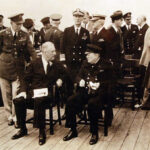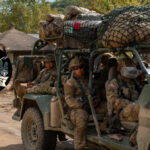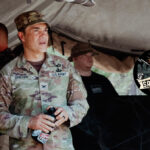
A little over two years ago we sat down with the students and advisors of Integrated Research Project (IRP) #6. Their task was to examine leadership development requirements in the multi-domain operations environment in the year 2040. Due to a hardware malfunction we thought we had lost the recordings of these conversations, but just recently we were able to recover the files. Though the conversation has a couple of dated references, we thought the topic was definitely worth airing. A BETTER PEACE is happy to welcome Greg Hillebrand, Tim Monroe, and Chance Geray to the studio for the first of three episodes to discuss what the team found looking forward twenty years. In this first episode they look at some of the biggest changes in the environment that will affect leadership requirements of the future. They’ll lay the foundation for the changes necessary to ensure U.S. military leadership is prepared for the challenges of future warfare and peacekeeping.
No longer will it be acceptable to say, well, this is your time infantry. This is your time airplanes. This is your time artillery. It has to go beyond integration. Everything will be happening simultaneously, and it will be commanders and soldiers jobs to go beyond integration and be able to bring every element of national power.
Podcast: Download
Chance Geray is a graduate of the AY 19 resident class at the U.S. Army War College and a Colonel in the U.S. Air Force. He earned his commission through Air Force ROTC at North Dakota State University in 1997. He has served in staff, and operational command positions both in-garrison and deployed throughout the communications and cyberspace career field. He is currently the Commander of the 81st Training Group at Keesler Air Force Base, Mississippi.
Tim Monroe is a graduate of the AY 19 resident class at the U.S. Army War College and a Colonel in the U.S. Air Force. He received his commission as a Distinguished Graduate from the Air Force ROTC program at Embry-Riddle Aeronautical University in Daytona Beach, Florida. A graduate of the Euro-NATO Joint Jet Pilot Training Program, his assignments include flying operations in the F-15C, and MQ-9A in support of Operations NOBLE EAGLE and ENDURING FREEDOM. He served as Air Combat Command’s Persistent Attack and Reconnaissance Division Chief prior to his current assignment as the Commander, 25th Attack Group, Shaw Air Force Base, South Carolina.
Greg Hillebrand is an assistant professor in the Center for Strategic Leadership at the U.S. Army War College. He previously served as a military analyst in Space and Cyberspace as well as a faculty member in the Department of Military Strategy, Planning and Operations. His Air force career was primarily focused in the space and missile operations community.
Buck Haberichter is the Managing Editor of the War Room.
The views expressed in this presentation are those of the speakers and do not necessarily reflect those of the U.S. Army War College, U.S. Army, U.S. Air Force or Department of Defense.
Photo Credit: Background photo created by vanitjan – www.freepik.com





The concept of “Multi-Domain Operations” (MDO), this looms large in our “leadership development” discussion above. In this regard, let us look at how MDO sees the conflict environment; this, via the Congressional Research Service (CSR) item “CRS INSIGHT: The U.S. Army and Multi-Domain Operations,” January 17, 2019, by Andrew Feickert:
“MDO is described in detail in ‘The U.S. Army in Multi-domain Operations 2028.’ MDO was developed in response to the 2018 National Defense Strategy (NDS), which shifts the previous focus of U.S. national security for countering violent extremists worldwide to confronting revisionist powers — primarily Russia and China — who are said to ‘want to shape a world consistent with their authoritarian model — gaining veto authority over other nations’ economic, diplomatic, and security decisions.’ ”
As an alternative to the foundational ideas of MDO and NDS above, consider that what Russia and China may actually be trying to do today, this is to — via “containment” and “roll back” strategies — defeat the U.S./the West’s post-Cold War “transformational” and “expansionist” strategies.
(As to the U.S./the West’s such post-Cold War “transformational” and “expansionist” strategies, consider the following from then [1993] National Security Advisor Anthony Lake’s “From Containment to Enlargement” document — a precursor to Bill Clinton’s “Engagement and Enlargement” strategic document:
“Throughout the Cold War, we contained a global threat to market democracies; now we should seek to enlarge their reach, particularly in places of special significance to us. The successor to a doctrine of containment must be a strategy of enlargement — enlargement of the world’s free community of market democracies. During the Cold War, even children understood America’s security mission; as they looked at those maps on their schoolroom walls, they knew we were trying to contain the creeping expansion of that big, red blob. Today, at great risk of oversimplification, we might visualize our security mission as promoting the enlargement of the ‘blue areas’ of market democracies. The difference, of course, is that we do not seek to expand the reach of our institutions by force, subversion or repression.”)
As per my thesis above (we are doing “transformation” and “expansion” today; they are doing “containment” and “roll back” now), the goal of Russia and China, in the New/Reverse Cold War of today, this would be to:
a. Defeat our efforts to transform their (Russia and China’s) states and societies more along modern western political, economic, social and value lines. (This, much as in the Old Cold War, it was our goal to defeat the Soviets/the communist’s efforts to transform our states and societies more along communist political, economic, social and value lines) and also to:
b. Defeat our efforts to transform other states and societies throughout the world along such market-democracy lines also. (This, much as in the Old Cold War, it was our goal to defeat the Soviets/the communist’s efforts to transform other states and societies throughout the world; in that case, along communist political, economic, social and value lines.)
A confirmation of my such thesis above, this would seem to depend on our finding that, (a) in the “containment” and “roll back” efforts of Russia and China in the New/Reverse Cold War of today, (b) Russia and China (much as we did versus them during the Old Cold War of yesterday) were “courting” — and seeking to work more “by, with and through” — one’s “natural allies” in these such “containment” and “roll back” efforts. These such “natural allies” — of the “containment” and “roll back” entities now as then — being the more-conservative/the more-traditional/the more-no-change (and/or reverse change; this, if too much unwanted change has already taken place) elements of one’s own, one’s opponent’s and indeed the world at-large’s populations.
And guess what? This is exactly what find Russia and China doing today. In this regard, we need look no further than to our own homelands:
“Compounding it all, Russia’s dictator has achieved all of this while creating sympathy in elements of the Right that mirrors the sympathy the Soviet Union achieved in elements of the Left. In other words, Putin is expanding Russian power and influence while mounting a cultural critique that resonates with some American audiences, casting himself as a defender of Christian civilization against Islam and the godless, decadent West.” (See the “National Review” item entitled: “How Russia Wins” by David French.)
“Liberal democratic societies have, in the past few decades, undergone a series of revolutionary changes in their social and political life, which are not to the taste of all their citizens. For many of those, who might be called social conservatives, Russia has become a more agreeable society, at least in principle, than those they live in. Communist Westerners used to speak of the Soviet Union as the pioneer society of a brighter future for all. Now, the rightwing nationalists of Europe and North America admire Russia and its leader for cleaving to the past.” (See “The American Interest” article “The Reality of Russian Soft Power” by John Lloyd and Daria Litinova.)
Bottom Line Thought — Based on the Above:
The thesis presented by MDO and NDS above — that Russia and China are “revisionist” entities who “want to shape a world consistent with their authoritarian model—gaining veto authority over other nations’ economic, diplomatic, and security decisions;” this such thesis, I suggest, does not well explain the phenomenon noted in my two quoted items above.
A thesis, however, which suggests that what Russia and China are trying to do to the U.S./the West — in the New/Reverse Cold War of today — this is exactly what we tried (and indeed did) to them in the Old Cold War of yesterday — THIS such thesis, I suggest, does better explain this phenomenon.
Thus, if based on such evidence as I have presented here, my thesis is considered more reasonable, then how and when might we get about the business of crafting a new NDS, a replacement for MDO and, thereby, come to address such things as “leadership development” (etc.) from a new and better perspective?
With regard to such things as our current National Defense Strategy (NDS), Multi-Domain Operations (MDO) and Leadership Development Programs relating to same, here is the question that we must ask ourselves:
Does the current NDS, MDO and Leadership Development Programs relating to same — very clearly, very loudly and very significantly acknowledge and address — a/the most-critical (?) security threat phenomenon that we now find before us. This being, that our competitors/our opponents/our enemies in the New/Reverse Cold War of today (and much as we did versus them in the Old Cold War of yesterday) are now:
a. Actively “courting” — and seeking to work more “by, with and through” — the more-conservative/the more-traditional/ the more-no-change (and/or reverse unwanted change) elements of the world’s populations. (Those such elements in these competitors, etc.’s, own countries, those such elements in our homelands and, indeed, those such elements in states and societies throughout the entire world.) This such activity being undertaken so as to:
b. “Contain” — and indeed to “roll back” — U.S./Western power, influence and control throughout the world.
Bottom Line Thought — Based on the Above:
If the current NDS, MDO and Leadership Development Programs relating to same DO NOT so clearly, so loudly and so significantly acknowledge and address the phenomenon I describe above,
Then, I suggest, we must — obviously — and in relation to all such items — “go back to the drawing board.”
Let me use TRADOC Pamphlet 525-3-1: “The U.S. Army in Multi-Domain Operations 2028” and, therein, Paragraph 2 (“The Problem”), which is to be found within “The Executive Summary,” to make some important points; points that I believe that “leadership development” must come to deal with. In this regard, note the explanatory items in parenthesis — that I have placed in the quoted paragraph below: Here goes:
“b. China and Russia in competition.
In a state of continuous competition (which we might call the New/Reverse Cold War), China and Russia exploit the conditions of the operational environment (the alienating of the more-conservative/the more-traditional/the more-no-change elements of the world’s governments and populations; this, due to the market-based, political, economic, social and/or value “changes” that the U.S./the West has promoted and implemented, both here at home and there broad, since the 1980s) to achieve their objectives (which are, to “contain” — and to ultimately “roll back” — the power, influence and control of the U.S./the West) without resorting to armed conflict by fracturing the U.S.’s alliances, partnerships, and resolve. They attempt to create stand-off (another way of saying “containment” and/or “roll back?”) through the integration of diplomatic and economic actions, unconventional and information warfare — social media, false narratives, cyber attacks — and the actual or threatened employment of conventional forces. By creating instability within countries and alliances (negative: the instability already exists — and indeed this is our fault — as I have outline above), China and Russia create (negative: they simply take advantage of) political separation that results in strategic ambiguity reducing the speed of friendly recognition, decision, and reaction. Through these competitive actions, China and Russia believe they can achieve objectives (“containment” and “roll back,” as I have noted above) below the threshold of armed conflict.”
In the “state of continuous competition” known as the Old Cold War, the U.S./the West “exploited the conditions of the operational environment,” to wit: the alienating of the more-conservative/the more-traditional/the more-no-change elements of the world’s governments and populations; this, due to the (communist-based in that case) political, economic, social and/or value “changes” that the Soviets/the communists had promoted and implement, both in their homelands and elsewhere throughout the world, after World War II. We did this to achieve the U.S./the West’s objectives back then; which were, to “contain” — and to ultimately “roll back” — the power, influence and control of the Soviets/the communists.
As the author of the “War on the Rocks” article “America Did Hybrid Warfare Too” notes below (in that case, as relates to hybrid war), we should not be surprised when Russia and China utilize these same methods that we did. Such methods are, after all and as he notes, “available to any power with the motivation to employ them.”
“That the United States and NATO, a conventional defensive alliance, should be confounded by similar maneuvers on the part of Russia and left groping to “connect the dots” from Crimea to the Baltic is not a surprise. What should not be a matter for confusion is that hybrid warfare is not the exclusive province of a nefarious Putin, but rather a method available to any power with the motivation to employ it. This takes us only half way toward a solution. But, in paraphrase of Clausewitz, the first essential act of judgment is to establish the kind of war in which we are embroiled.
Bottom Line Thought — Based on the Above:
Re: such things as “leadership development,” thus, to take some time to acknowledge the true and actual “kind of war in which we are embroiled,” to wit: a New/Reverse Cold War?
From the introduction to this podcast above:
“No longer will it be acceptable to say, well, this is your time infantry. This is your time airplanes. This is your time artillery. It has to go beyond integration. Everything will be happening simultaneously, and it will be commanders and soldiers jobs to go beyond integration and be able to bring every element of national power.”
Question:
a. If a/the primary “element of national power” (which is found in the U.S./the West itself, in our opponent countries, and, indeed, in countries throughout the world) — that we used to “contain” and “roll back” the power, influence and control of the Soviets/the communists (who were seeking to advance radical communism both at home and abroad back then) — if this such primary “element of national power” that we used back then was, shall we say, the no-change “conservatism” (“the commitment to traditional values and ideas with opposition to change or innovation” — see the Oxford Languages Dictionary),
b. Then, in the New/Reverse Cold War of today — when it has been the U.S./the West who has sought to advance a radical concept (neo-liberalism?) both here at home and there abroad — why should we not expect (and, indeed, not plan and prepare for) nations such as Russia and China using worldwide no-change “conservatism” now; this, as (a) a/the primary “element of national power” (found in their countries, in our countries and, indeed, throughout the world) that (b) they would now use in their efforts to “contain,” and “roll back,” the power, influence and control of the U.S./the West?
“In Putin’s view, the fight over values is not far removed from geopolitical competition. ‘[Liberals] cannot simply dictate anything to anyone just like they have been attempting to do over the recent decades,’ he said in an interview with the Financial Times in 2019. ‘There is also the so-called liberal idea, which has outlived its purpose. Our Western partners have admitted that some elements of the liberal idea, such as multiculturalism, are no longer tenable,’ he added. …
(See The Wilson Center’s “Kennan Cable No. 53” and, therein, in the article “Russia’s Traditional Values and Domestic Violence,” by Olimpiada Usanova, dated 1 June 2020.)
Bottom Line Thought — Based on the Above:
If, as per the Multi-Domain Operations concept, our Field Armies are required to “execute competition against our near-peer competitors,” then the leadership of and within these such Field Armies, I suggest, must:
a. Understand the threat posed by no-change (and/or reverse change) “conservatism” and
b. Be provided sufficient tools with which to combat this such element of a nation’s national power.